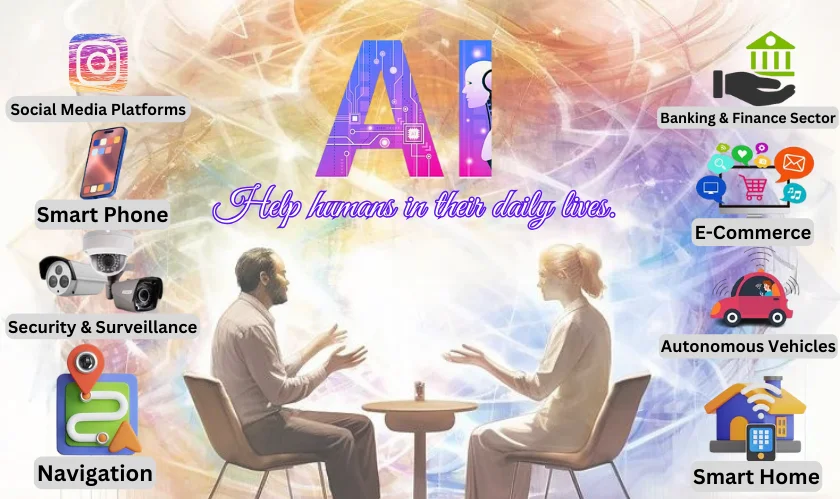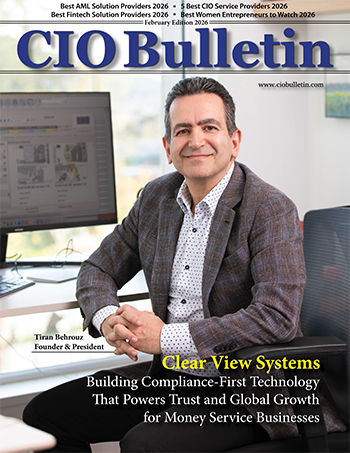Home Technology Artificial intelligence How does artificial intelligen...
Artificial Intelligence

CIO Bulletin
19 March, 2024
Artificial intelligence (AI) is revolutionizing a number of sectors and facets of contemporary life, including healthcare, entertainment, transportation, and education. Artificial intelligence has had a huge influence and is now a necessary component of our daily lives.
AI is causing machines to think and behave like humans. Developers design and program it to do activities depending on human data that is presented digitally. Artificial intelligence has become a vital component of daily life. It is utilized in many sectors to build robots capable of performing a variety of activities. This technology reduces human labor, accelerates work, and yields precise results.
AI is used in many fields to simplify life and provide better results. It’s spreading rapidly, helping people save time and effort. More and more businesses are integrating technology into their products, making it impossible for us not to interact with AI in some form. This article will discuss the importance of AI in everyday life, how it affects us, and the benefits it provides.
AI virtual assistants have transformed how we engage with technology, providing individualized support and enhancing efficiency in different areas. These sophisticated AI virtual assistants use artificial intelligence algorithms to interpret user inquiries, complete tasks, and give pertinent information in real time. As we approach 2024, the need for AI virtual assistants grows, and there are numerous solutions available to meet a variety of demands.
AI virtual assistants have transformed our interactions with technology, providing individualized support and enhancing productivity across multiple areas. These sophisticated AI virtual assistants use artificial intelligence algorithms to answer user inquiries, complete jobs, and deliver pertinent information in real time. As we approach 2024, the need for AI virtual assistants grows, with a wide range of alternatives available to meet a variety of demands.
10 Best AI Virtual Assistants to Make You More Productive in 2024
By 2029, the AI-integrated real estate industry in the US is estimated to reach $1335.89 billion. Additionally, the generative AI segment in real estate is projected to reach $1047 million by 2032. These two data points highlight the significance and efficacy of AI in the real estate market.
AI-powered Smart home technology are rapidly emerging in the real estate industry. Smart homes are becoming more popular because of benefits such as energy efficiency, lower utility bills, automation convenience, and increased security. AI and generative AI serve both merchants and buyers in many ways. Today's focus will be on AI-powered Smart home technology, their convenience, and future prospects.
Automation is one of the best features of AI smart homes. With AI constantly learning about the resident's choices and preferences, it can automate how all of the appliances work, making homeowners' or residents' lives easier.
AI-enabled devices in Smart home technology communicate with a central command system via a shared WiFi network. The commands travel in wavelengths via the wireless network, instructing the device to perform the intended function. A smart home contains an abundance of voice-activated devices and appliances.
AI is widely employed on entertainment platforms like YouTube, Netflix, and Amazon Prime Video to personalize suggestions for viewers. AI algorithms can recommend movies, TV episodes, music, books, and other content to consumers based on their preferences, browsing history, and behavior.
Recommendation systems collect user data, analyze profiles, browse and view history, and discover behavioral commonalities and patterns. Machine learning algorithms employ previous data to construct predictive models of consumer preferences. They then provide customized recommendations that are constantly updated and improved in response to user input and interactions. This feedback loop improves the accuracy and relevance of recommendations over time.
Netflix's personalized recommendations
Netflix, one of the world's most popular streaming services, uses AI algorithms to deliver personalized suggestions to its users. Netflix's recommendation engine proposes material based on user data, watching habits, and past preferences, enhancing user engagement and happiness.
In an age of extraordinary technical developments, Artificial intelligence (AI) stands out as a transformative force, notably in healthcare. From wearables to wellness, AI in Healthcare is transforming the landscape, bringing in a new era of proactive wellness management as well as preventive care.
The combination of artificial intelligence and healthcare represents a paradigm shift, promising not only treatment but also proactive well-being.
AI has significant potential to improve practically every element of healthcare and health research, including monitoring, diagnosis, clinical trials, health care delivery, and health economics. AI has the ability to tailor healthcare monitoring, diagnosis, and treatment for individuals in the community and at home.
Realizing the potential of AI in healthcare necessitates a strong link between AI expertise, existing health (domain) expertise, key stakeholders, and the general public.
AI integration in Remote Patient Monitoring (RPM) improves patient care, increases efficiency, and allows for early intervention. RPM uses technology to remotely monitor patients' health problems, minimizing the need for regular in-person appointments. The addition of AI algorithms expands RPM's potential by evaluating massive volumes of patient data to find trends, abnormalities, and potential concerns.
The travel and tourism industry has faced several challenges in recent years, including meeting diverse traveler expectations, increasing operational efficiency, and improving travel security. The powerful force of artificial intelligence has ushered in a new era of travel, improving operational efficiency, personalizing customer experiences, and raising safety standards.
AI in the travel industry creates new personalized experiences, with each approach based on strategic research and tailored to individual needs. According to Statista, the worldwide AI in travel market was estimated at $81.3 billion in 2022 and is projected to be worth $423.7 billion by 2027, with a 35% CAGR.
The rise of artificial intelligence allows hotels to use techniques for personalizing room temperature, lighting, and music based on guest preferences. The incorporation of AI technology has significantly improved the customer experience by offering real-time customer support, optimizing pricing strategies, and much more.
Advantages of Leveraging AI in Tourism and Travel
Artificial intelligence is rapidly transforming our environment. Artificial intelligence is becoming increasingly significant in the Language translation tools market. Advanced Language translation tools and software facilitate effective communication between individuals and businesses.
The AI software market is growing steadily. In 2022, the AI software sector is expected to be valued at more than $328 billion. By 2029, the market is projected to be valued at more than $1.3 trillion.
AI software will continue to rely heavily on language translation, shaping the industry's future. Can an artificial language translate as well as humans? Even the best Language translation tools technologies cannot work independently right now. AI is rapidly transforming the translation industry, creating new opportunities for human translators, and altering the practical use of machine translation technologies.
How AI is transforming the translation industry
Even though artificial intelligence will not replace human translators anytime soon, it is helping to reshape the translation services sector. It makes the entire process more efficient and has far-reaching implications.
In everyday situations, AI makes it simple for individuals to get quick and somewhat reliable translations. Tourists traveling around the world can use services like Google Translate to quickly translate daily conversations.
AI can improve communication between translation specialists and non-native speakers. Even the most skilled translator will not have a perfect understanding of the second language in which they operate; therefore, artificial intelligence translates when necessary to help cover lexical gaps.
Currently, the most significant advances in translation services are dependent on a few emerging technologies.
Conclusion:
When it comes to real-world applications, AI has advantages. We ought to interact with it in some way. However, some may argue that it is harmful to our physical or mental health. Still, the benefits outweigh the drawbacks by a large proportion. Increased productivity is one of the most significant benefits, as it allows the business to soar to new heights and accelerate its development.
As previously discussed, increased use benefits everyone: businesses because it allows them to grow with fewer resources, individuals because it increases work output, and thriving developers like you because it increases job opportunities.
FAQ:
1. How do virtual assistants like Siri and Alexa simplify daily tasks?
Virtual assistants use speech recognition to turn spoken words into text, followed by natural language understanding to comprehend their meaning. They utilize algorithms and machine learning models to analyze information and provide relevant replies.
2. What are the benefits of incorporating smart home technology into daily life?
Smart home automation can help reduce a household's energy consumption by programming energy-consuming devices such as heating, lighting, irrigation, and so on to only operate under certain conditions or on a set schedule.
3. How do personalized recommendation algorithms enhance the entertainment experience?
Data science enables entertainment platforms to provide personalized content recommendations that fit with consumers' interests, preferences, and viewing behaviors. This not only improves the user experience but also boosts engagement and satisfaction.
4. What role does AI play in health and wellness monitoring through wearable devices?
Wearable device data can be analyzed using AI algorithms to help healthcare providers identify patterns, predict health outcomes, and make informed patient care decisions.
5. How do navigation apps utilize AI to improve travel assistance?
AI-powered navigation apps are distinguished by their adaptive capabilities. Using machine learning algorithms, these services constantly improve their accuracy and efficacy, providing users with personalized navigation tailored to individual tastes and changing traffic dynamics.

Insurance and capital markets







